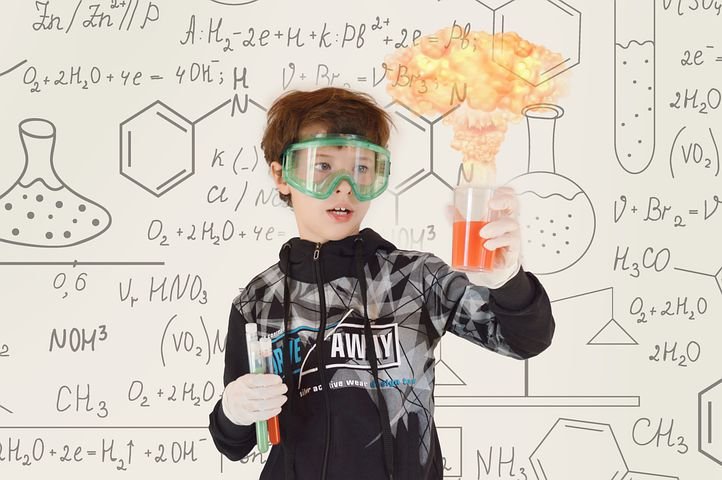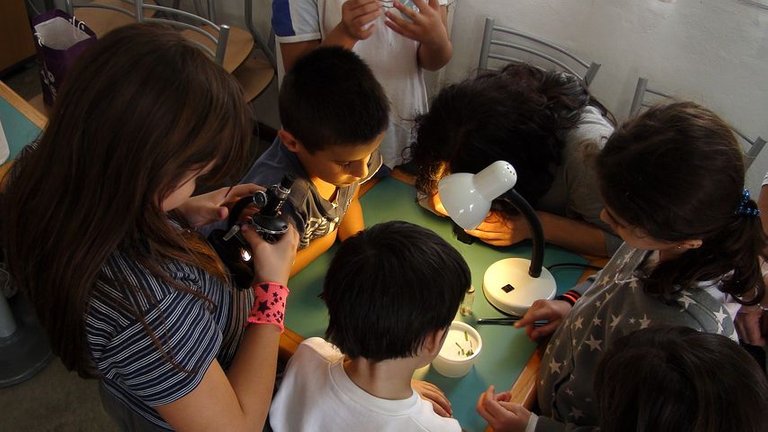Developing Scientific Attitude In Children.
Hi family, I'm here again to continue from were I stop.
Today we shall consider how to developed scientific attitude in children. Why i am so interested with children is because, they are the future hope of every one of us. They are the great inventors the world is looking for. So we ought to catch them young.
 [source] (https://pixabay.com/photos/chemistry-baby-experiment-science-5632654/)
[source] (https://pixabay.com/photos/chemistry-baby-experiment-science-5632654/)
There are three domain of learning, there are - cognitive, affective, and psychomotor.
Cognitive domain, deals with the knowledge component of learning while affective domain relates to issues of attitude, interests, value, and psychomotor domain is concerned with practical skills.
Now what is this scientific attitude?
An attitude is a psychological construct which determines how an individual behaves towards an object, situation or event. It is a disposition to like or dislike the attitude object (attitude object is the person, object, situation or event that is focus of the behavior).
Thus, a child should have positive attitudes towards science before he can offer science and go on to any of the science -related occupation. Scientific attitudes deal with the attitudes of scientists when they are doing science.
There are certain behaviors expected of a person that calls himself a scientist as science supposedly moulds the character of its practitioners. These behaviours are collectively called scientific attitude. Elements of scientific attitude are:
Curiosity, rationality, suspended judgment, open-minded, critical -mindedness, objectivity. Honesty and humility is also important to any individual that is a scientists. As the person gets involved in the scientific enterprise, these behaviours permeate his entire life.
 [source] (https://pixabay.com/photos/children-they-investigate-microscope-183007/)
[source] (https://pixabay.com/photos/children-they-investigate-microscope-183007/)
This explains why children should be encouraged to develop scientific attitudes.
It will restrain them from jumping into conclusions, make them question any thing before accepting it, give natural explanations to natural events, enable them to appreciate the fact that they do not know everything and that science itself has limitations. Science dose not have answer to all problems.
Let's look at some components of scientific attitudes that I mention earlier.
• curiosity :- this is stimulus to inquiry. Children want to fine out. They ask questions, seek information from available source.
• Rationality :- this is the habit of looking for natural causes for natural events. Superstition has no place in a rational person.
• suspended judgment :- people with this attitude do not jump into conclusions. They wait until all available data are collected before making a final judgement. Example, When a person behaves to them in an unusual manner, they will not quickly conclude that it is because of the quarrel they had the previous day. They will still want to fine out why the person behaved in the way he did before reaching a conclusion.
• Open- mindedness :- This is closely related to suspended judgment. A scientist does not hold to his idea alone. More information may prove that his idea is outdated. He therefore has to change.
Example, as atom was initially seen as an indivisible part of an element. But as scientific research progressed, it was discovered that an atom consists of protons, neutrons and electrons..
• critical -mindedness:- A person with this attitude looks for evidence and arguments that support another person's assertions.
He does not accept a statement because 'so and so' has said it. He questions the authority to arrive at the truth.
• objectivity :- An objective person does not allow his personal feelings to interfere with the recording of an observation or the interpretation of data. complete objectivity, however, is difficult to achieve because the way an observer looks at a situation is governed by his previous experience and his expectations.
• Honesty:- This is concerned with the conscious act of reporting observations truthfully. Scientists do not have to falsify their results because what they obtain is different from another person's.
• Humility :- A person that is humble will know that he has limitations and that science itself has limitations. Science cannot solve all problems.
So how do you develop this scientific attitudes in children...
To develop scientific attitudes in children requires that you present your science lesson in an intellectual and stimulating manner. By this it's means that your science lesson should not be dominated by telling the children facts alone. You should present them with challenging situations that will make them think and carry out activities on their own.
1• Curiosity : - Children are naturally curious. So you ought to encourage them by allowing them to ask questions and you give them honest answers.
2• suspended judgment :- This can be developed by rewarding this types of behaviour and punish the formation of conclusion without evidence.
3• open minded :- provide the children opportunity to design their own investigations, invent, and evaluate their own explanations for natural phenomena. Encourage the children to give consideration to ideas which are different from theirs.
4• objectivity and honesty :- present the children with open -ended problems ask them to Investigate and report back to you. Your correction of their reports may help to foster these scientific attitudes.
Note: you should not behave as if you have answers to all their questions. In situations when you do not know the answer, tell them so and that you will fine out. You can also ask them to find out.
Thank you and have a bless week.